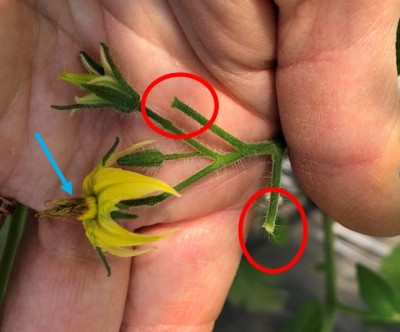Blossom Blast and Bumblebees
Amy Ivy, Vegetable Specialist
Eastern New York Commercial Horticulture
There are a variety of reasons why blossoms might blast on tomatoes. Blast is a dramatic term for when the blossoms die and fall off before fruit can set. Temperatures over 95, manganese and zinc deficiencies, and pepMV virus are all possible causes. Some plants even do some self-thinning and shed blossoms when their fruit load is too great. But this week was the first time I had heard of the concept of over-pollination, and it seems several growers are having trouble with this in their early, heated high tunnel tomatoes.
Bumblebees are ‘buzz pollinators,' meaning they shake the pollen out of the anthers by buzzing. They bite onto the anthers and then vibrate their bodies to shake loose the pollen. For an amazing video clip of how this works visit: https://www.youtube.com/watch?v=SZrTndD1H10 . Growers with heated tunnels can start their tomatoes extra early but they need to buy in bumble bees to pollinate since the native ones are not yet active.
Usually this process works fine but sometimes there are more bees than flowers and the hungry bees come back to the same flower multiple times, trying to shake more pollen loose. Too much of this aggressive feeding can kill the flowers (see photos).
One grower estimates he has lost half of all of his first flower clusters, a loss of about $2400, so this damage can be serious. The bee supplier has renamed its product line this year and most of our growers are ordering the ‘start-up' hive. But this hive was developed for high volume hydroponic producers in mind and has more bees than usual. I visited three growers with this problem this week and we would be very interested to know how many others are having this problem. Please call, text or email me (adi2@cornell.edu or 518-570-5991).
Photo: Notice the darkened anthers (blue arrows) and the dropped blossoms (red circles). A little bit of darkening is tolerable but the flowers will drop if this much damage occurs.
This article is from the April 26, 2018 edition of ENYCHP Vegetable News. To read the full newsletter, CLICK HERE.


Upcoming Events
2025 Berry Twilight Meetings
July 2, 2025 : Berry Twilight Meeting at Dressel Farms
New Paltz, NY
Join Heather Kase, CCE ENYCHP, and Anna Wallis, Cornell IPM, for seasonal updates on berry pest man-agement and IPM.
July 16, 2025 : Berry Twilight Meeting at Samascott Orchards
Kinderhook, NY
Join Heather Kase, CCE ENYCHP, and Anna Wallis, Cornell IPM, for seasonal updates on berry pest man-agement and IPM.
August 6, 2025 : Berry Twilight Meeting at Fishkill Farms
Hopewell Junction, NY
Join Heather Kase, CCE ENYCHP, and Anna Wallis, Cornell IPM, for seasonal updates on berry pest man-agement and IPM.
Vegetable Field Meetings with Dr. Steve Reiners
July 14, 2025 : Herkimer County - Ivan Martin's Farm
Herkimer, NY
Topics: Tomato Fertility and Mitigating Physiological Disorders; Pest Scouting, ID, and IPM Field Walk.
July 15, 2025 : Washington County - Hand Melon Farm
Greenwich, NY
Topics: Tomato Fertility and Mitigating Physiological Disorders, Tomato and Sweet Corn IPM; FSMA Water Assessments and Postharvest Sanitation
July 16, 2025 : Ulster County - Wallkill View Farm
New Paultz, NY
Topics: Tomato Fertility and Mitigating Physiological Disorders; Veg Pest Update and Management; Cornell Tomato Breeding Program and Slicer Tomato Variety Trial Tour
Champlain Valley Orchard Field Afternoon
July 17, 2025 : Champlain Valley Orchard Field Afternoon
Chazy, NY
This July ENYCHP will be hosting an orchard field afternoon highlighting Mike's research trials at Chazy Orchards.












































